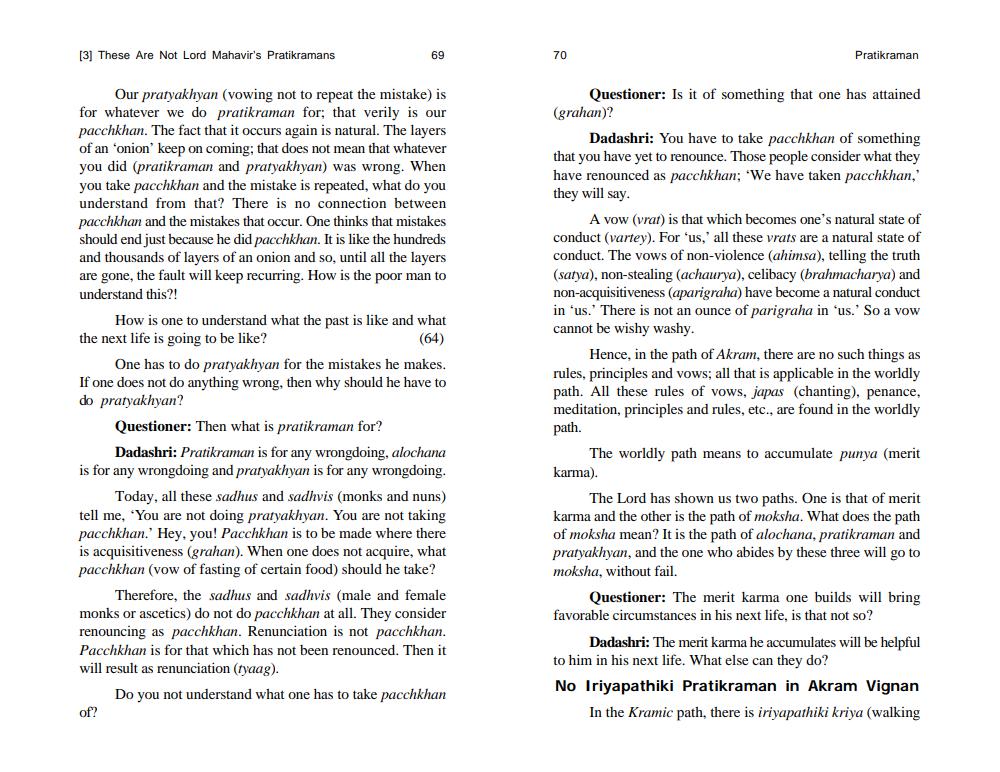________________
[3] These Are Not Lord Mahavir's Pratikramans
70
Pratikraman
Our pratyakhyan (vowing not to repeat the mistake) is for whatever we do pratikraman for; that verily is our pacchkhan. The fact that it occurs again is natural. The layers of an 'onion' keep on coming; that does not mean that whatever you did (prarikraman and pratyakhyan) was wrong. When you take pacchkhan and the mistake is repeated, what do you understand from that? There is no connection between pacchkhan and the mistakes that occur. One thinks that mistakes should end just because he did pacchkhan. It is like the hundreds and thousands of layers of an onion and so, until all the layers are gone, the fault will keep recurring. How is the poor man to understand this?!
How is one to understand what the past is like and what the next life is going to be like?
(64) One has to do pratyakhyan for the mistakes he makes. If one does not do anything wrong, then why should he have to do pratyakhyan?
Questioner: Then what is pratikraman for?
Dadashri: Pratikraman is for any wrongdoing, alochana is for any wrongdoing and pratyakhyan is for any wrongdoing.
Today, all these sadhus and sadhvis (monks and nuns) tell me, 'You are not doing pratyakhyan. You are not taking pacchkhan.' Hey, you! Pacchkhan is to be made where there is acquisitiveness (grahan). When one does not acquire, what pacchkhan (vow of fasting of certain food) should he take?
Therefore, the sadhus and sadhvis (male and female monks or ascetics) do not do pacchkhan at all. They consider renouncing as pacchkhan. Renunciation is not pacchkhan. Pacchkhan is for that which has not been renounced. Then it will result as renunciation (tyaag).
Do you not understand what one has to take pacchkhan of?
Questioner: Is it of something that one has attained (grahan)?
Dadashri: You have to take pacchkhan of something that you have yet to renounce. Those people consider what they have renounced as pacchkhan; "We have taken pacchkhan, they will say.
A vow (vrat) is that which becomes one's natural state of conduct (vartey). For 'us,' all these vrats are a natural state of conduct. The vows of non-violence (ahimsa), telling the truth (satya), non-stealing (achaurya), celibacy (brahmacharya) and non-acquisitiveness (aparigraha) have become a natural conduct in 'us.' There is not an ounce of parigraha in "us.' So a vow cannot be wishy washy.
Hence, in the path of Akram, there are no such things as rules, principles and vows, all that is applicable in the worldly path. All these rules of vows, japas (chanting), penance, meditation, principles and rules, etc., are found in the worldly path.
The worldly path means to accumulate punya (merit karma).
The Lord has shown us two paths. One is that of merit karma and the other is the path of moksha. What does the path of moksha mean? It is the path of alochana, pratikraman and pratyakhyan, and the one who abides by these three will go to moksha, without fail.
Questioner: The merit karma one builds will bring favorable circumstances in his next life, is that not so?
Dadashri: The merit karma he accumulates will be helpful to him in his next life. What else can they do? No Iriyapathiki Pratikraman in Akram Vignan
In the Kramic path, there is iriyapathiki kriya (walking




